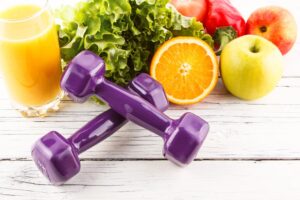How to lose weight effectively
To lose weight effectively, the simple equation is calories in versus calories out. If you burn more calories than you eat, then you shed the pounds.
Of course, it is much more complex than that but, we believe that simple messages and simple solutions are often the most effective.
There are a huge number of websites dedicated to weight loss so we have sifted through them to come up with some pointers that will help you lose weight effectively and safely.
Slow and steady way to lose weight effectively
The first thing to note is slow and steady is the best principle when it comes to losing weight safely. Set small and realistic goals in order to maintain weight loss and reach a target weight.
Here are some simple maths: one pound of fat contains 3,500 calories. If you cut your calories by 500 calories a day, you will lose a pound in a week. Small changes like this will make a big difference over a six month period.
Take control through portion size
Portion control is a key area when it comes to weight loss. By using a smaller plate and not accepting second helpings, you will find it easier to cut portion sizes. From the NHS weight loss pages, here are some portion sizes for common foods:
Pasta and rice – 2-3 tablespoons
Bread – one medium slice
Cooked meat – size of a deck of cards
Milk – 200ml
Hard cheese – size of a matchbox
Beans or pulses – 4 tablespoons
Planning is everything
If you plan ahead and make sure you have the ingredients you need to make a meal, that will help reduce snacking on unhealthy foods. Try planning a week of healthy meals and buy the ingredients you need to make them. If time is often an issue, try bulk cooking meals in one go and then freeze portions for later in the week.
Try to reduce the amount of larger pack sizes and in-store promotions as these are often foods that are high in salt, fat and sugar. By cooking your own meals from scratch, you control exactly what you are eating.
Keep active to lose weight

It is recommended that adults should try to be active every day and complete at least 150 minutes of moderate aerobic activity or 75 minutes of vigorous activity every week. This could be cycling, rowing, running, power walking, swimming or any activity that raises your heart rate for a sustained period.
While aerobic activity is hugely important, it is also essential that resistance training comes into your weekly activity schedule. This can include workouts with weights or machines or you can do circuits and classes that use body weight as resistance. What is important, is that your muscles get a regular workout so they are toned and flexible. This will help maintain good bone health as well as making daily activities easier.
You are what you eat
When it comes to training and diet, what you eat is as important as how much you eat.
Protein is essential as it helps build and repair muscles. When you are dieting, protein becomes increasingly important as it helps to prevent muscle loss while dieting. Protein also has a high satiety value, meaning you feel full faster when you are eating.
Protein can be found in lean meats such as chicken and turkey, fish such as tuna and some red meat cuts. Egg whites and greek yoghurt are also great sources of protein.
Vegetables are absolutely key to a healthy diet. They are fibrous carbohydrates that contain few calories but a large amount of nutrients that will help your body work to its best.

While it might seem counterintuitive to recommend eating fat, there are some good fats out there. Foods such as cashews, almonds, pistachios and walnuts (raw, not roasted or salted), avocado, olives and fatty fish are all good sources of healthy fat.
These fats help maintain energy levels, thus avoiding a spike. They also have positive effects upon your body’s systems – the endocrine, cardiovascular and nervous system. Don’t eat these proteins in large quantities but two or three portions a day, depending upon your exercise levels, will keep your body functioning well.
Finally, we do not advocate cutting out carbohydrates altogether. But, to lose weight effectively, try to only eat carbs to replace the energy you have burnt during a high intensity workout. The advice from the team at Kelsey Kerridge is “don’t eat carbs just because you can; eat carbs when you have worked for them.”








